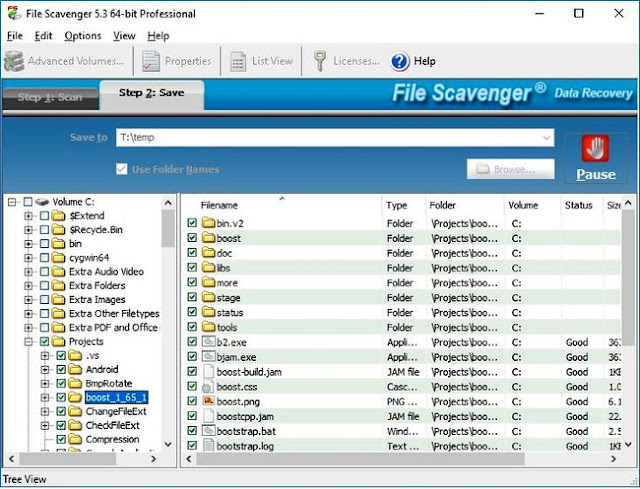We’ve all had that moment when we’ve deleted a file by mistake, or worse, a drive simply failed. File Scavenger® is the program you go to when you need to get that lost data back. Working with hard drives, memory cards, flash drives and more, this data recovery software is great at finding deleted files on a wide range of file systems.
File Scavenger® is a file "undelete" and data recovery utility for Windows® 10, 8, 7, Vista, Server 2003, XP and 2000. File Scavenger® can recover files that have been accidentally deleted (including files removed from the Recycle Bin, in a DOS window, from a network drive, from Windows Explorer with the SHIFT key held down) provided that recovery is attempted before the files are permanently overwritten by new data. File Scavenger® supports both basic and dynamic disks, NTFS compression, alternate data streams, sparse files, Unicode filenames, etc. Except in severe cases, both the file and the folder path leading to the file can be recovered.

File Scavenger® can also recover files from a reformatted or corrupted volume even when the volume has been deleted and its original position and size are unknown. File Scavenger® can scan an entire physical hard drive to look for traces of defunct volumes.
File Scavenger® uses advanced algorithms to handle disks with bad sectors and badly corrupted partitions. It can be installed on a hard drive or run from a portable storage device such as a memory card, removable drive, or CD. To run File Scavenger®, you must log on as a system administrator to the computer where data recovery is intended. Files can only be restored if the disk areas allocated to the files have not been overwritten by new data. All recovered files should be validated for the integrity of the recovered data.
* Advanced features in boldface require a premium or professional license.
File Scavenger® is a file "undelete" and data recovery utility for Windows® 10, 8, 7, Vista, Server 2003, XP and 2000. File Scavenger® can recover files that have been accidentally deleted (including files removed from the Recycle Bin, in a DOS window, from a network drive, from Windows Explorer with the SHIFT key held down) provided that recovery is attempted before the files are permanently overwritten by new data. File Scavenger® supports both basic and dynamic disks, NTFS compression, alternate data streams, sparse files, Unicode filenames, etc. Except in severe cases, both the file and the folder path leading to the file can be recovered.

File Scavenger® can also recover files from a reformatted or corrupted volume even when the volume has been deleted and its original position and size are unknown. File Scavenger® can scan an entire physical hard drive to look for traces of defunct volumes.
File Scavenger® uses advanced algorithms to handle disks with bad sectors and badly corrupted partitions. It can be installed on a hard drive or run from a portable storage device such as a memory card, removable drive, or CD. To run File Scavenger®, you must log on as a system administrator to the computer where data recovery is intended. Files can only be restored if the disk areas allocated to the files have not been overwritten by new data. All recovered files should be validated for the integrity of the recovered data.
File Scavenger® Data Recovery Software
| Platforms | Windows® 10/8/7/Vista, Server 2016/2012/2008 32-bit and 64-bit. Windows® XP and Server 2003 (File Scavenger® version 4.3). Windows® 2000 and NT (File Scavenger® version 3.2). |
| Media | Hard disks, memory cards, flash drives, RAID, RAIDZ, NAS and more. |
| Types of files | All file types. |
| Causes of data loss | Accidental file deletion. Removal from Recycle Bin, network drive. Unbootable computer. Drive restored to factory settings. Corrupted drive. Reformatted or deleted partition. Crashed drive. Undetected drive. Drive hanging, dropping offline intermittently. Failed RAID, spanned, or NAS volume. |
| Recovered information | Original filename, contents, folder path and dates. |
| File systems | NTFS, FAT 32/16/12, exFAT, ReFS, ext3, ext4, Btrfs, HFS+, HFSX, UFS1, UFS2, XFS, ZFS and RAIDZ, VMFS, VMDK, VHD and VHDX. |
| Languages | English, Chinese, Dutch, French, German, Italian, Japanese, Portuguese, and Spanish. |
| Other features | Both dynamic and basic disks, Unicode filenames. Compressed NTFS volumes, NTFS alternate data streams. |
| Related Program | Read and clone bad hard drives with Disk Recoup™. |
* Advanced features in boldface require a premium or professional license.
File Scavenger® Data Recovery key features
- Supports nested spanned volume, RAID and virtual drives (VMDK/VHD/VHDX) in many combinations.
- Supports Btrfs.
- Groups trivial volumes under one subtree. Trivial volumes contain no or little user data. They may clutter up the results.
- Shows deleted data in a separate subtree.
- Supports VMFS long scan.
- Saves the recovered data from multiple volumes in one operation.
Comments
Post a Comment